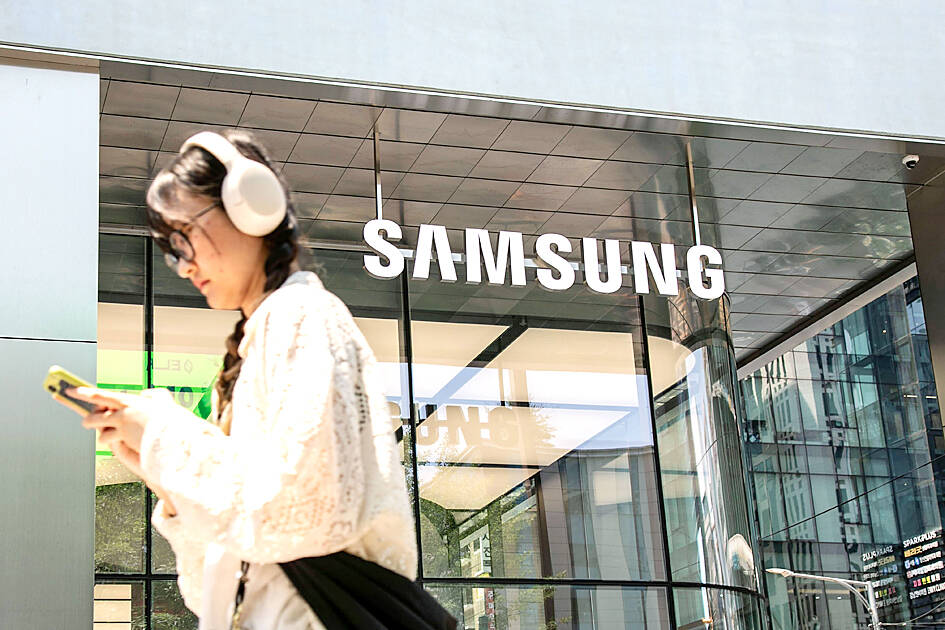Samsung Electronics Co is laying off workers in Southeast Asia, Australia and New Zealand as part of a plan to reduce its global headcount by thousands of jobs, sources familiar with the situation said.
The layoffs could affect about 10 percent of its workforces in those markets, although the numbers for each subsidiary might vary, said one of the sources, who asked not to be named because the matter is private.
Job cuts are planned for other overseas subsidiaries and could reach 10 percent in certain markets, the source said.

Photo: Bloomberg
The South Korean company has about 147,000 in staff overseas, more than half of its total employees of more than 267,800, its latest sustainability report said.
It is not planning layoffs in its home market.
Samsung staff across different teams in Singapore were called into private meetings on Tuesday with human resource managers and their reporting managers, and were informed of the retrenchment and severance package details, another source familiar with the matter said.
“Some overseas subsidiaries are conducting routine workforce adjustments to improve operational efficiency,” a Samsung spokesperson said.
“The company has not set a target number for any particular positions,” the spokesperson added.
Samsung shares have slid more than 20 percent this year as the world’s largest maker of memory chips and smartphones struggles in key markets. It has fallen behind rival SK Hynix Inc in the memory chips used for artificial intelligence (AI), and has made little progress against Taiwan Semiconductor Manufacturing Co (台積電) in the production of custom-made chips for outside customers.
The task of leading Samsung through its latest challenges now falls to executive chairman Jay Y. Lee, grandson of the company’s founder. The 56-year-old was acquitted of stock manipulation charges in February after years of legal troubles.
Samsung is in the unusual position of playing catch-up to SK Hynix, which took the lead in producing the high-bandwidth memory chips that are paired with Nvidia Corp’s AI accelerators to train AI models.
Samsung abruptly replaced the head of its chip business this year and the newly appointed chief, Jun Young-hyun, said the company had to change its workplace culture or get caught in a “vicious cycle.”
The company has reduced the size of its workforce in the past as it has navigated the notoriously cyclical memory-chip market. Samsung recently trimmed about 10 percent of jobs in India and some parts of Latin America, according to one of the sources.
In the latest push, Samsung is likely to cut less than 10 percent of its total overseas staff of 147,000, the source said.
The company aims to preserve manufacturing jobs, while it cuts management and support functions. The figures would be affected by local labor regulations and financial priorities.
Samsung has also been feuding with employees in South Korea. The largest of the tech giant’s several unions called the company’s first strike ever in May.

NEW IDENTITY: Known for its software, India has expanded into hardware, with its semiconductor industry growing from US$38bn in 2023 to US$45bn to US$50bn India on Saturday inaugurated its first semiconductor assembly and test facility, a milestone in the government’s push to reduce dependence on foreign chipmakers and stake a claim in a sector dominated by China. Indian Prime Minister Narendra Modi opened US firm Micron Technology Inc’s semiconductor assembly, test and packaging unit in his home state of Gujarat, hailing the “dawn of a new era” for India’s technology ambitions. “When young Indians look back in the future, they will see this decade as the turning point in our tech future,” Modi told the event, which was broadcast on his YouTube channel. The plant would convert

‘SEISMIC SHIFT’: The researcher forecast there would be about 1.1 billion mobile shipments this year, down from 1.26 billion the prior year and erasing years of gains The global smartphone market is expected to contract 12.9 percent this year due to the unprecedented memorychip shortage, marking “a crisis like no other,” researcher International Data Corp (IDC) said. The new forecast, a dramatic revision down from earlier estimates, gives the latest accounting of the ongoing memory crunch that is affecting every corner of the electronics industry. The demand for advanced memory to power artificial intelligence (AI) tasks has drained global supply until well into next year and jeopardizes the business model of many smartphone makers. IDC forecast about 1.1 billion mobile shipments this year, down from 1.26 billion the prior

People stand in a Pokemon store in Tokyo on Thursday. One of the world highest-grossing franchises is celebrated its 30th anniversary yesterday.

Zimbabwe’s ban on raw lithium exports is forcing Chinese miners to rethink their strategy, speeding up plans to process the metal locally instead of shipping it to China’s vast rechargeable battery industry. The country is Africa’s largest lithium producer and has one of the world’s largest reserves, according to the US Geological Survey (USGS). Zimbabwe already banned the export of lithium ore in 2022 and last year announced it would halt exports of lithium concentrates from January next year. However, on Wednesday it imposed the ban with immediate effect, leaving unclear what the lithium mining sector would do in the